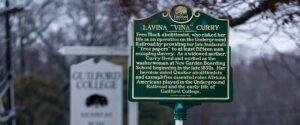Written by Cheri Todd Molter
In his article entitled “Hidden Figure: How a Black Washerwoman Helped Free 15 Slaves,” Ross Howell, Jr. writes, “We don’t know where ‘Vina’ was born or how she died. We have no likeness of her—no etching or drawing. Yet a Guilford College historical marker honors what she did. Professor emerita Adrienne Israel played an essential role in preserving and telling Vina’s story.” Lavina “Vina” Curry was a free Black woman who was employed by the New Garden Boarding School—which later became Guilford College—as a washerwoman.
Dr. Israel uncovered Vina’s story while conducting research on the “Quaker community, the local free Black population, and the roles individuals played in helping [enslaved people] escape North Carolina via the Underground Railroad.” She found a memoir written by Addison Coffin, a cousin of Quaker abolitionist Levi Coffin, that was published in 1897. Addison Coffin wrote, “There was a free negro named Arch Curry, living near our home, who died a few years after father…His widow’s name was Vina; she was the washerwoman for the boarding-school for several years.” In that memoir, Vina was described as a “shrewd and discerning” woman who had kept “her husband’s free papers” on hand after his death. The phrase “free papers” refers to documents drawn up by county courts to certify a Black person was free and not enslaved.
Vina allowed individuals seeking freedom from enslavement to use her deceased husband’s papers as identification. “This was done 15 times to my knowledge,” Coffin wrote in his memoir. He explained that, after the person obtained their freedom, Levi Coffin would return the borrowed free papers to Vina, so she could share them again. “This was done occasionally with other [people’s] papers,” Coffin concluded, “but none were ever used like those of Arch Curry.”
So, Coffin’s memoir confirmed Dr. Israel’s belief that local free Black people helped the Underground Railroad, but then she needed to prove that Arch and Vina Curry existed. Howell writes, “Deed books showed that in 1820 a Black freeman named Archibald Curry had purchased land on Brushy Creek in Guilford County, and, a year later, more land on Horsepen Creek. Between the 1820 and 1830 censuses, Curry’s household grew from himself, his wife, and two children to [having] seven children—four male and three female. His name doesn’t appear in the 1840 census, so apparently Arch died about the time Coffin…noted in his memoir.”
Regarding the existence of Vina Curry, the 1840 census counted three female “free colored persons” at the New Garden Boarding School, and one was a washerwoman named Vina Curry, age 55. Quaker archivist and special collections librarian Gwen Erickson, assisted Dr. Israel with her research, locating entries in the school’s ledger for “Lavina Curry.” No entries for Lavina are found after 1843. Howell writes, “It was Erickson who secured funding for Vina Curry’s historic marker, dedicated in 2022 as part of a national consortium of universities studying slavery. Erickson says the marker reminds us that there were more free Black citizens who worked with the Underground Railroad” and whose stories are waiting to be discovered.
Source: Howell, Jr., Ross. “Hidden Figure: How a Black Washerwoman Helped Free 15 Slaves,” O Henry Magazine, Feb. 2024. https://ohenrymag.com/hidden-figure/?fbclid=IwAR3dGFOZWwrKFYbbtjY02uS7GAsPwx5aSYvptiZFrcwR4bQs8-z8dFpx3rQ

